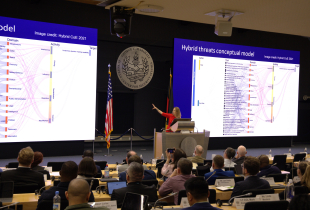
Commander of Germany’s New Cyber Command: ‘Facing the Digital Future Together’
By Dr. Felicia Englmann
Bundeswehr Bavaria
GARMISCH-PARTENKIRCHEN, GERMANY (Dec. 28, 2017) – “Digitalization is a game changer,” said Bundeswehr Lt. Gen. Ludwig Leinhos, commander and chief of Germany’s newly founded Cyber and Information Domain Service, to 98 participants from 51 countries as the graduation speaker for the Program on Cyber Security Studies at the George C. Marshall European Center for Security Studies Dec. 21.
“Digitalization addresses and affects us all,” Leinhos said. “We are all profiting from this progress in technology, the Bundeswehr as well.”
Founded in 2014, the three-week Program on Cyber Security Studies helps participants appreciate the nature and magnitude of today’s threats and develops a common understanding of the best practices and current initiatives within the public and private cyber sectors.
“Information and communications technology is nearly a part of all our processes and activities from logistics to command control, so we are taking advantage of the progress that technology is providing for us,” he said. “This progress will also, of course, have significant impact on future development of armed forces as technology will severely impact the future systems that we will have in the armed forces.”
The Cyber and Information Domain Service is the new service of the Bundeswehr and was established in April 2017.
“The Cyber and Information Domain will most likely play a decisive part in future military and comprehensive operations,” Leinhos said. “Therefore, we need to understand tomorrow‘s technologies to be successful in future crisis management.”
Leinhos said military forces were impacted by digitalization in five main aspects: weapons systems and equipment; how processes will work in the future, organization and skill sets needed by personnel; air, land sea, and cyber domain military operations; future scenarios and conflicts in digitalized states; and, emphasizing more whole-of-government approaches, especially in the cyber domain.
“Whole of government approach is one of the things that The Marshall Center is addressing as well,” Leinhos said.
The Marshall Center is a German-American international security and defense studies institute. It was designated in 2014 by the U.S. Department of Defense as a Center of Excellence for Transnational Security Studies, due to its cybersecurity
In the last graduation ceremony at the Marshall Center in 2017, Dr. Andrew Michta, dean of the College of International and Security Studies, addressed the graduates and pointed out how important it is to create networks among people, experts and alumni to not only form an information-technology-based, but also a personal human-to-human network to form a resilient chain of defense.
Cyber Challenges
“Cyber is the new bloodstream of the world that is going to emerge in the next 10 to 15 years,” Michta said. “Shared tasks and responsibilities among states, the application of international law to cyberspace regarding state behavior, additional voluntary laws for peacetime and confidence-building measures need to work to enhance international cyber security.”
During his visit, Leinhos also said that international law and regulations regarding cyberspace need further development.
It was Leinhos’ first visit to the Marshall Center and his impression was overall positive, he said in an interview following his keynote address and talks with senior Marshall Center staff.
“There have already been course participants from my service, and I am rather certain that we will contribute guest speakers in the future,” he said.
German-American relations have helped shaping his new service, he explained during the interview.
“We were in contact with the American side when establishing our service and obtained valuable advice on which components, capabilities departments and domains to include and merge in our new organization,” he said. “The U.S. military played an important role in this process, and we already established cooperation.”
Leinhos is certain that the transatlantic bond would always be a pillar in mutual cyber defense and in facing the future.
“It is a global mission, and increased digitalization holds many benefits for us, but also many challenges that we have to tackle together,” Leinhos said. “Germany and the U.S. – being two highly digitized countries – are destined to be heralding in this process.”
